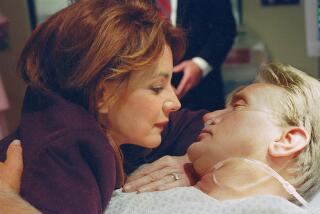Book Review : First Lady as the Prime Detective
The White House Pantry Murder by Elliott Roosevelt (St. Martinâs: $15.95)
Blessed by heredity with a cast of characters not only impossible to acquire any other way but in no position to object to the use he makes of them, Elliott Roosevelt again turns his mother into a solemnly intuitive detective in the fourth âEleanor Roosevelt Mystery.â
Set, like its predecessors, in the White House during his fatherâs presidency, this one casts F.D.R. and Churchill as intended victims of an assassination plot, with assorted military and civilian luminaries in walk-on roles; Sir Alan Burton of Scotland Yard plays second lead. Filling out the large cast of actual and imagined people is a pair of young romantics: a young British naval officer, Lt. Cmdr. George Leach, with Harry Hopkinsâ voluptuous secretary Bonny Battersby as the woman who works her obvious charms upon him. Theyâre supplemented by a generous complement of White House aides, special investigators, secret service men and domestic staff.
When the body of an unknown young man is discovered on the floor of a White House refrigerator during the crucial visit by Winston Churchill during the grim 1941 Christmas season, the corpse is spirited off the premises with only the inner circle aware anything untoward has happened. In that dark period--American forces beaten back in the South Pacific, England assaulted nightly by German bombs--evidence that the White House itself was vulnerable to attack would have seriously damaged the nationâs already shaky morale. Dressed from the skin out in brand-new clothes from Sears, Roebuck & Co., without a shred of identification anywhere on him, the victim remains utterly anonymous until the last third of the book, though the extremely remote chance that he had wandered by mistake into the refrigerator and frozen to death is soon dispelled by the discovery of an inconspicuous but fatal ice pick wound at the base of his skull.
Body in Pantry
The investigation is barely under way when a second corpse appears in the White House pantry; this one not so neatly dispatched. Body II has been shot, and is found lying face down in a pool of blood. Unlike the first casualty, who met his fate in a cheap business suit, this body is dressed in a short olive drab jacket, breeches, boots and cap, a paramilitary outfit quickly perceived as an approximation of a Western Union messengerâs uniform. Because it seems somewhat unlikely that a telegram delivery man on a bicycle could be simply waved into the wartime White House, the author reminds us that full-scale security measures were not yet in place; several yawning gaps in the system still to be closed. The entire plot turns upon this appalling laxity; much of the opening section is devoted to the discovery of how the first victim gained entry to the house and the die-in refrigerator.
Once this is satisfactorily explained, and the second victim disavowed by Western Union, the pace thickens slightly. As might be expected, the two invaders are not common burglars with their eye on the celebrated presidential stamp collection, but men with world-shaking evil in mind. Though everyone employed in the White House is at first assumed to be above suspicion, some of these credentials turn out to be less impeccable than others.
Suspicion inevitably falls upon the luscious and complaisant Miss Battersby, who, for a nice girl from Bangor, Me., has made herself all too available to dashing Lt. Cmdr. Leach. With understandable reluctance, since she has made this tour of duty so unexpectedly agreeable, he agrees to help with the investigation, turning up a list of disconcerting facts; nothing the lady canât explain, but still enough to make Leach wary of a woman so prematurely liberated.
Churchill in His Bath
The inquiries are interlarded with intimate glimpses of Churchill in his bath (six cakes of soap, a bottle of brandy and his cigars), generous quotes from the memorable speech he would make in Canada (âSome chicken! Some neck!â), details of Harry Hopkinsâ predilection of oyster feasts at midnight, of the First Ladyâs Spartan lunches of tuna fish sandwiches and ice water, of F.D.R.âs frail secretary Missy Le Hand, who despite her failing health was still Rooseveltâs most cherished confidante; all privileged information the author employs effectively to lend an otherwise routine procedural novel an extra dimension of interest. Without this special material, âThe White House Pantry Murderâ would be all too predictable, despite the transformation of the First Lady into Prime Sleuth.
Though her contribution is small, itâs both crucial and entirely in character. Had fate put Eleanor Roosevelt into a picturesque English village and given her Agatha Christie as her Boswell, she might have been formidable competition for Miss Marple. Here, sheâs just her admirable self with a quirky new talent.
More to Read
Sign up for our Book Club newsletter
Get the latest news, events and more from the Los Angeles Times Book Club, and help us get L.A. reading and talking.
You may occasionally receive promotional content from the Los Angeles Times.






